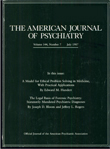al-Razi (Rhazes), 865–925
Abu Bakr Mohammed ibn Zakariya al-Razi, known in the West as Rhazes, was born in al-Rayy outside Tehran. He is considered one of the greatest physicians Islam has ever produced. He traveled widely, visiting famous medical centers of his time in Jerusalem, Cairo, and Cordova. In 907 he was appointed director of a large hospital in Baghdad and a court physician as well. He wrote 237 books, of which 36 have survived. The most famous of his works is Liber Continens, a medical encyclopedia.
In his theories, al-Razi was a Galenist; in practice, he was guided more by the principles of Hippocrates (1). He was known for taking detailed histories from his patients and for his keen observational skills. al-Razi combined psychological methods and physiological explanations. He used psychotherapy in a primitive but dynamic fashion (2).
As the director of the hospital in Baghdad, he established a special section for the treatment of the mentally ill. He treated his patients with respect, care, and empathy. As part of discharge planning, each patient was given a sum of money to help with immediate needs. This was the first recorded reference to psychiatric aftercare and, perhaps, to the existence of a psychiatric consultation service in a general hospital.
al-Razi is also known for his contributions to psychiatric ethics. In his treatise “Upon the Circumstances Which Turn the Head of Most Men From the Reputable Physicians,” al-Razi set clear standards for the professional practice of physicians. He advised physicians on how to retain the respect and confidence of their patients. At the same time, he advised patients to evaluate their physicians and demand from them a high level of integrity. He further advised patients to avoid physicians who are actively addicted to wine, a clear recognition of the problem of physician impairment over 1,000 years ago. al-Razi's words on this subject are no less applicable today (3).
Address reprint requests to Dr. Daghestani, Department of Psychiatry, Loyola University Medical Center, 2160 South First Ave., Maywood, IL 60153. Photograph courtesy of Parke-Davis.

1. Parke-Davis & Co: Rhazes and Arabic medicine, in Great Moments in Medicine. Stories by Bender GA; paintings by Thom RA. Detroit, Northwood Institute Press, 1966, pp 62–67Google Scholar
2. Alexander FG, Selesnik ST: The History of Psychiatry: An Evaluation of Psychiatric Thought and Practice From Prehistoric Times to the Present. New York, Harper & Row, 1966, p 62Google Scholar
3. Gordon BL: Medieval and Renaissance Medicine. New York, Philosophical Library, 1959, pp 152–164Google Scholar



